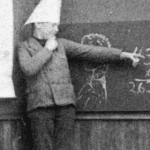
(Wikimedia Commons public domain image)
A characteristic argument advanced by the great C. S. Lewis, and one that I find persuasive, runs roughly as follows (in the summary offered by Professor Peter Kreeft of Boston College in his book The Shadow-Lands of C. S. Lewis: The Man Behind the Movie: Selections from the Writings of C. S. Lewis [San Francisco: Ignatius Press, 1994], 71):
If we have an innate, natural desire for X. there must be an X.
We have an innate, natural desire for Heaven, for a greater world than these “shadow-lands”.
Therefore there must be a Heaven.
Here’s one of C. S. Lewis’s comments, from his famous essay on The Weight of Glory, regarding the subject:
[W]e remain conscious of a desire which no natural happiness will satisfy. But is there any reason to suppose that reality offers any satisfaction to it? “Nor does the being hungry prove that we have bread.” But I think it may be urged that this misses the point. A man’s physical hunger does not prove that that man will get any bread; he may die of starvation on a raft in the Atlantic. But surely a man’s hunger does prove that he comes of a race which repairs its body by eating and inhabits a world where eatable substances exist. In the same way, though I do not believe (I wish I did) that my desire for Paradise proves that I shall enjoy it, I think it a pretty good indication that such a thing exists and that some men will. A man may love a woman and not win her; but it would be very odd if the phenomenon called “falling in love” occurred in a sexless world.
If the argument isn’t exactly a “slam dunk,” it seems to me nonetheless at least a powerful indicator, a hint, of the truth. And that, I think, is pretty much where things are supposed to be: There are plenty of things that point toward the existence of God, of purpose, and so forth. But they aren’t, and they aren’t intended to be, literally compelling. We aren’t to be forced.
As the lyrics to a song that appeared in the very first Latter-day Saint hymnal, back in 1835, put it:












